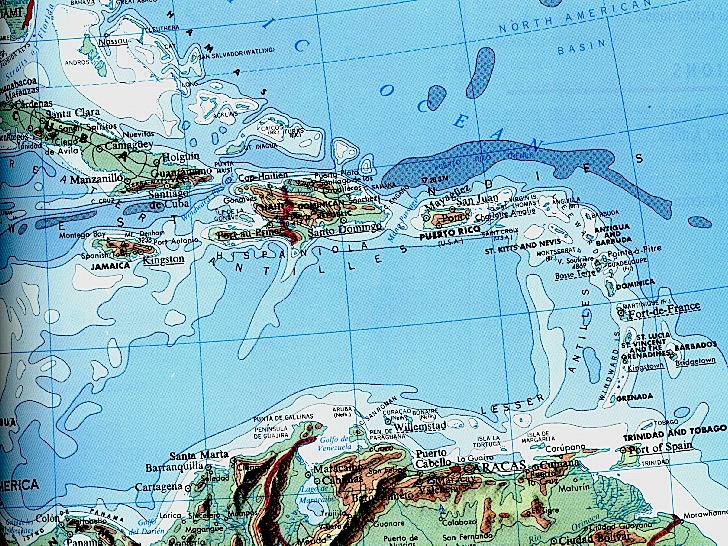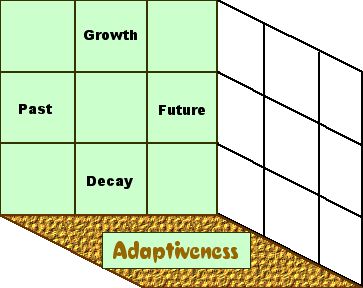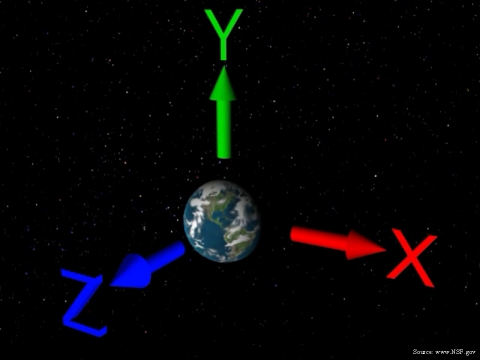Themes
| Thesis | Model | Summary
| Outline | Lesson

Themes
| Thesis | Model | Summary
| Outline | Lesson

“Wild oscillations...commonly follow upon contact between previously isolated ecosystems....”
196
“such epidemics transfigured the history of humanity in the Americas, oscillations similar in magnitude were sweeping other species.”
197
“Europe entered Africa, and the ecological disruptions were severe.”
198
“Brining previously isolated ecosystems together is much like flicking a cigarette lighter near open containers of gasoline. Sometime nothing will happen. Some of the time the fumes will ignite and blow your head off.”
p. 198.
“Put as simply as possible, the problem is this: we can shake loose from our home planet, but we most assuredly cannot leave our DNA behind us.”
p. 200.
- See more on European success
- Added focus on biology and history
- What is a cultural hearth?
- What is culture?
Model
of how conditions may change
creating dynamic stasis:
| loss of territory |
|
rise in population |
| Famine |
|
Surplus |
| decline in population |
|
gain in territory |
Themes | Thesis | Model | Summary | Outline | Lesson
Summary
“We have crossed the oceans and both benefited and suffered the consequences.”
p. 191.

“Every ecosystem is in danger of being smothered by the reproductive excesses of its members, but is usually saved from this fate by the appetites of its members--that is, the participating organisms obligingly eat up each other's excessive offspring.”p. 192.
“The results are perhaps the most awesome example of the influence of technology of all time.”
p. 195.
The last two million years of geologic changes.
Adaptability
Adaptiveness defined as a product of tool use and technology:
Technology related to naval exchanges and naval intrusions of one ecosystem on another:Age of Exploration was the product of three traditions in Eurasia
The Crosby Thesis: On the Columbian Exchange
Importance of virgin soil epidemics in the outcome of the exchange:
Impacts of the European disturbance of the Americas and the West Indies:
detailed outline
¶
Implacably hostile environs
second
humans themselves
and the irrepressible organisms they will carry with them.
191
¶
Professions view the world very differently:
| Engineers | Biologists | |
|
control
|
vs.
|
unexpected
|
|
predictive
|
vs.
|
stochastic
|
|
progress
|
vs.
|
adaptiveness
|
Thus, the predictions made by each differ dramatically because they are constrained by vastly distinct variables.
191
Ecology defined
The internal adjustments creatures make to external conditions; social ecology focuses on group or species behavior while the individual's reactions to the surrounding conditions is the focus of autecology.
Surrounding conditions are defined by two tandem sets of interactions:
| interactions | one | two |
| non-living | living systems | |
| name | Habitat | Biocoenose |
| description | field situation | biotic community |
| conditions | inorganic, abiotic | organic, biotic |
| meaning | never alive | living or once living |
| examples | water, wind, sun, slope, depth | detritus, humus, vegetation, animals, fungus |
¶
What will happen to life forms in the hermetic hermitages
of space?
¶
Kindergarten ecology
¶
“The depend largely on one another even for death, which is necessary for
the continued health of the system.”
191
“...reproduce many times more than is needed to simply replace the parents numerically.”
192
¶
“A matter of SHIFTING BALANCES among its participants"
homeostasis or dynamic stasis
stasis is defined as a state, status or condition in which some factors may change but these factors fluctuate around a mean; the mean is a set of average circumstances that alter within a set range of changes that people, organisms and vegetation adjust to over short and longer periods of time.
In the West Indies, the Arawakan speaking peoples were a wave of migrants from the Amazon basin and Guiana plateau who altered a preexisting condition of the Ciboney peoples who preceded them into the Greater and Lesser Antilles.
 Time
and space are dimensions.
Time
and space are dimensions.
Dimensions: the degree to which something extends or is measured.
X is the magnitude or extension of length.
Y is the vertical extension
Z is distance perpendicular to the length.
area means the extent of any two, 2 dimensions.
volume means the extent of any three dimensions
What if "time" is yet another magnitude, or dimension of space?
¶
“An individual organism does not exist in space and time
in general, but in a specific space and a specific time.”
Time is the duration that elapses, or the frequency between repeated events.
short vs long terms contrasted
The time frame for organisms is different between:
short-run (individuals) {a life time}
compared to
long-run (species) {several generations}
4 ¶
Henry 8th of England as a time traveler
192-193
“history is full of examples. We have, you see, done all of
this launching into space before.”
194
Adaptiveness is defined as a product of complex tool use and technology:
¶
Humanity taught itself to live in environments for which it was not and
still is not genetically adapted -- first by learning how to make tools....”
194
Adapt meant, and still refers to the act of becoming accustomed to, acclimated to, or "going native" in a new situation in which a person, group, or their allied plants and animals must make a living.
7¶
cultural evolution and adaptation of tools and human migration
194-195
Return to top of page
Themes | Thesis | Model | Summary | Outline | Lesson
Technology related to naval exchanges and naval intrusions of one ecosystem on another:
¶
“Three great naval traditions:”
Arabs 1000-1500
Chinese 1410-1433
Europeans 1450-1850
¶
“Chinese navigation right up to the sixteenth century was at least as good
as European.”
Wider sleeker hulls
compass
bamboo sails
1000s of ships
sailed to Japan, Indonesia, India and East Africa by 1433
¶
Europeans lagged behind, but played catch-up
Age of Exploration defined as the coming together of
three naval traditions in 1400s
¶
“Age of Exploration” 1400-1900
195
1291 Genoese Vivaldi
brothers circumnavigation, disappeared rounding Africa
1519-1522 Magellan's circumnavigation of the planet
Themes | Thesis | Model | Summary | Outline | Lesson
The events associated with the Columbian Exchange of biota, diseases, people, nutrition, and domestic animals and plants may be the most revolutionary, if not formative experience in recent (modern) history.
Comparable only to:
In modern history it represents the dawn of the Homogecene Period (recent geology)
- Alexander's conquest of Persia and India: 300 BCE
- Muslim, Mongol & Turkish Invasions: 700-1200 AD
- characterized by a blending of once separate species
- spread of invasive, nonnative (or exotic) species
- the loss of endemic species (restricted to certain locales)
- the decline of biological diversity:
- loss of species richness
- genetic differences declined
¶
“The ecological facet of this reunification was by far its most spectacular.
Guanches perished 1400-1490 on the Canary Islands
¶
“These happenings were omens what was to follow.”196
Importance of virgin soil epidemics in the outcome of the exchange:
virgin, is a politically loaded term.
It refers to an unspoiled condition, cherished more in Latin and Anglo societies when referring to young women, than when referring to young men. Thus its use with respect to land and resources is a disturbing, or less than descriptive term.
What is needed is an accurate descriptive phrase for a previously isolated agrarian condition where the introduction of foreign, invasive elements disrupts a preexisting balance, or indigenous equilibrium among, fungus, plants, bacteria and animals.
¶
“While such epidemics transfigured the history of humanity...” “virgin soil epidemics”197
¶
“SImilar events mark the histories of Australia and New Zealand.”
¶
“Such biological spectaculars are not restricted to humans...”197
Impacts of the European disturbance of the Americas and the West Indies:
¶
“Europe entered the Americas and the ecological disruptions were severe.”198
“interstellar space travel...”
“viral DNA can lurk unmanifested in the nuclei of cells.”199
Optimists overlook the biology and the isolation bred endemism.
Endemic means confined to, and thus found only in one place, such as species unique to Jamaica, or Cuba, found only on those islands.
200
Lesson:
Engineering is not enough to understand the outcome of technology driven changes in ecological balances, instead biology is an essential ingredient in history.
Sources for these pages | Themes | Thesis | Model | Summary | Outline | Lesson
These buttons below work as navigational aids.